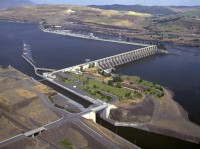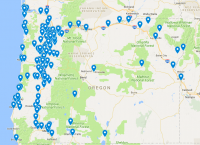Since the birth of the Waterkeeper movement, Keepers have been enforcing the laws that keep our water clean and safe.
STRATEGY TWO: Enforce the Law
Since the birth of the Waterkeeper movement, Keepers have been enforcing the laws that keep our water clean and safe. Sadly, some corporate polluters ignore the rules of the game to make a quick buck—at the expense of everyone downstream. The Clean Water Act is an important law, but as former Supreme Court Justice William Brennan warned, “Enforcement of the law is what really counts.” So that’s what Riverkeeper does. When polluters illegally dump waste into the Columbia and its tributaries, we go to court to protect clean water.
Nowadays, Riverkeeper also goes to court to protect the public’s access to information and its right to be heard when our leaders make important choices. This means challenging government officials who withhold public information or who write environmental impact statements that hide the harm caused by fossil fuel exports.
Why do we fight so hard for government transparency and truthful environmental reviews? Critics say that we litigate to cause delay. In reality, Riverkeeper believes that facts still matter and every person— not just wealthy, well-connected corporations— deserves a voice. So we insist that governments release information, make decisions in public, and tell the truth about how their decisions affect our water and health.
Transparency is not only central to our democracy, it’s how Riverkeeper wins grassroots campaigns against powerful, well-funded fossil fuel corporations. When the truth comes out and government officials are accountable to real people, we get better results.
Litigation is not the only, or even the first, strategy in our playbook. A lawsuit usually won’t permanently stop a bad project. But without litigation to obtain important documents or undo illegal backroom deals, we lose our chance to run other, winning plays.
After working for the U.S. Environmental Protection Agency in D.C. for six years, I left the paid workforce to care for my young children. I’m excited to join the hardworking staff at Riverkeeper and to share the results of that work with my three kids.
Enforcing the Law Case Studies:

Keeping toxic oil out of the Columbia
For years, the U.S. Army Corps of Engineers has spilled oil from eight large hydroelectric dams into the Columbia and Snake rivers. Some of that oil contained cancer-causing PCBs. Oregon and Washington tried unsuccessfully to get the Army Corps to clean up its act. Then, Riverkeeper sued under the Clean Water Act and forced the Army Corps to reduce its oil pollution and switch to non-toxic, biodegradable oils where feasible. The New York Times called this victory “historic” and the Wall Street Journal said the result was “groundbreaking.”
Fighting for transparency, against oil-by-rail
Port of Vancouver commissioners met in secret with Tesoro to negotiate a lease for Tesoro’s oil-by-rail terminal. Riverkeeper challenged the Port’s secret meetings for violating Washington’s Open Public Meeting Act. The Washington Supreme Court agreed with Riverkeeper and scolded the Port for shutting out the public. This victory created Supreme Court precedent to prevent future backroom deals between local governments and fossil fuel corporations, a victory that will promote transparency for years to come.
Shutting down Oregon’s only coal-fired power plant

In 2020 Oregon’s only coal-fired power plant will shut down. Wondering if you should send a thank-you note to Oregon regulators? Nope. It took a people-powered campaign and lawsuit brought by Riverkeeper and our partners to end decades of dangerous air pollution at Portland General Electric’s (PGE) Boardman coal-fired power plant.
In 2008, Sierra Club, Columbia Riverkeeper, Friends of the Columbia Gorge, Hells Canyon Preservation Council, and the Northwest Environmental Defense Center (NEDC), with legal representation from the Earthrise Law Center, launched a campaign to clean up the Boardman plant. Two years later, we won. PGE agreed to a binding shutdown date; lower sulfur dioxide limits during the plant’s final years in operation; and a $2.5-million penalty for violating the law.
Slashing toxic pollution at 800 industrial facilities

According to the National Research Council, urban stormwater runoff is the leading cause of water pollution in the United States. Fortunately, the Clean Water Act requires that industrial sites test stormwater and reduce pollution.
The stormwater permit matters because it controls how much toxic stormwater is discharged by 800 industrial sites. Riverkeeper and NEDC reached a legal settlement that requires the Oregon Department of Environmental Quality (DEQ) to reduce pollution from industrial facilities such as metal scrap yards, truck depots, and lumber yards.
With a stronger permit, the State of Oregon can keep thousands of pounds of toxic pollution out of our of rivers.
The Playbook Issue: How Columbia Riverkeeper is tackling corporate polluters, staving off fossil fuel giants, and inspiring people to fight for clean water.


